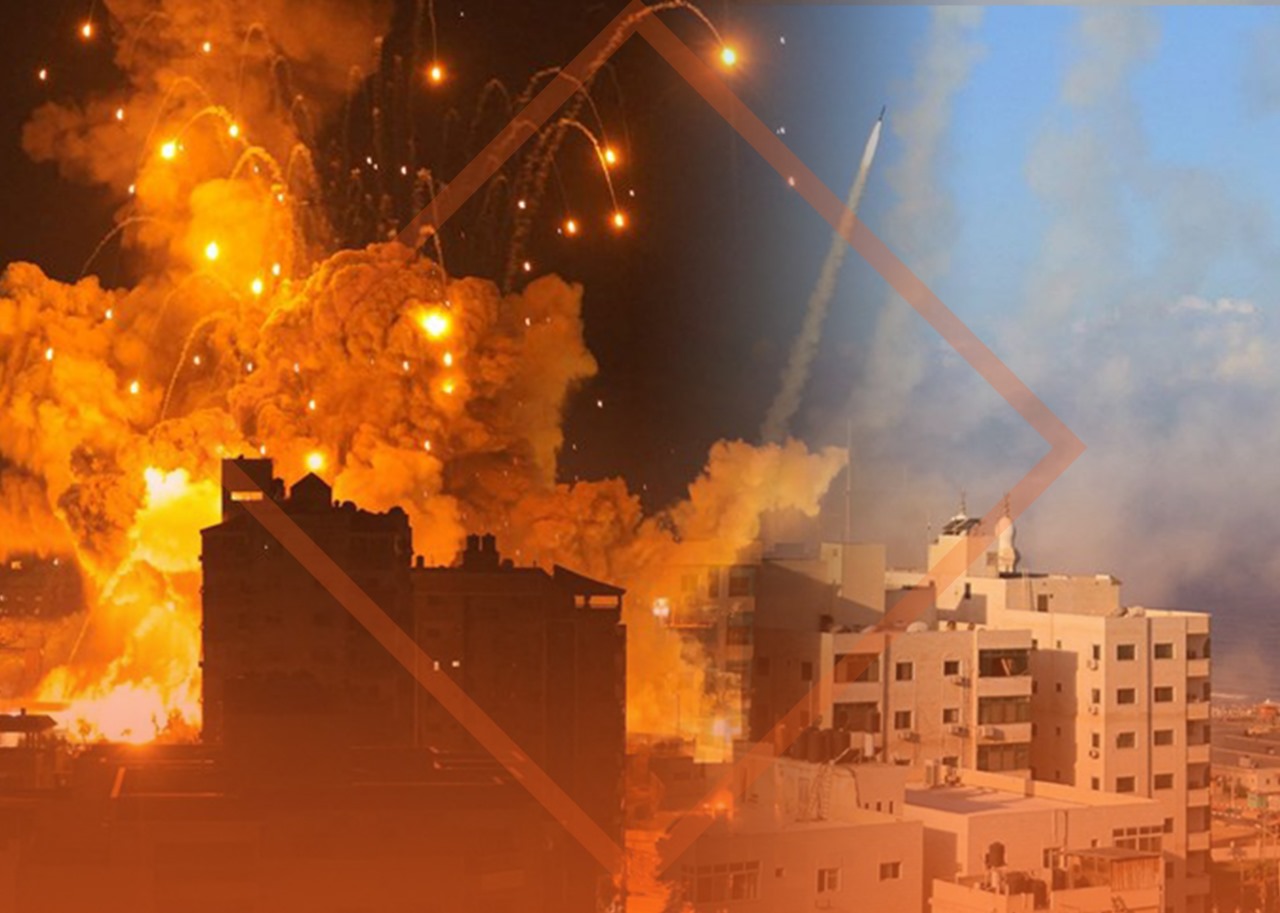On the recent Friday, the world witnessed a remarkable spectacle as rocket attacks, drones, and Hamas paratroopers unfolded in the ongoing conflict with Israel. Hamas employed an unconventional war strategy and multifaceted tactics that left Israel bewildered and the global community astonished by the dire circumstances in which Tel Aviv found itself.
As the conflict persists, a plethora of pressing questions arises: How did Hamas manage to divert the attention of a formidable state like Israel? Were previous assessments of Israel's capabilities overly optimistic, or has Hamas significantly bolstered its own strength? What lies on the horizon for this war? Will it expand into new territories or remain confined to its current boundaries? What impact will the ongoing debate over Iran's alleged support for Hamas have on the conflict? And how will the war's political and geopolitical repercussions play out?
To offer a brief and straightforward answer:
Firstly, Israel unquestionably a formidable nation with a military strength surpassing that of its regional counterparts, found itself becoming distracted. This serves as a prominent indicator of the evolving landscape of warfare in the 21st century, as technology advances, we enter an era where the power of the less powerful comes to the forefront, and sheer strength is no longer sufficient to safeguard a nation.
Secondly, the potential for escalation looms large, particularly if Iran or other groups like Hezbollah or Iraqi armed factions decide to intervene directly. Presently, neither the United States nor Israel has explicitly asserted Iranian direct involvement, suggesting a reluctance among the key stakeholders to escalate the conflict. However, it's important to remember that Israel's military doctrine has included elements of distraction warfare in the past, leaving room for uncertainty. Nevertheless, we must also consider the objectives of pro-Iranian groups in the region, even if Israel doesn't actively seek escalation. The fragile state of affairs leaves little margin for error, and the situation could swiftly spiral into a broader conflict.
Thirdly, the political and military ramifications of this war are far-reaching and multifaceted.
The Strength of Weakness
Amidst the uncertainties of the Hamas-Israel war, it is evident that the less powerful entities possess the potential to bolster their positions, highlighting that sheer strength alone is insufficient for safeguarding a state or a faction. Central to this transformation is the rapid proliferation of advanced warfare technology, empowering both state and non-state actors to engage in strategic maneuvers.
The Hamas attack underscores a statement by war theorist Michel Handel, emphasizing the effectiveness of an offensive strategy over a defensive one, given the innovations in warfare technology. This observation yields several important lessons: Security and military policies aimed at concealing and suppressing domestic concerns, particularly in the Middle East, may not always prove effective. The proliferation of military technology, including affordable missiles and drones operated by various groups, cannot be entirely prevented. Prominent examples include recent drone attacks by Hamas and other groups on a military college in Syria's Homs province.
This situation implies a protracted period of instability in the Middle East unless comprehensive solutions to critical issues are found. Meanwhile, the Kurdish question remains a pertinent and unresolved concern in the region, transcending repressive security and military approaches. The Hamas conflict highlights that the Kurdish issue, like the Palestinian issue, can only be resolved through the recognition of their rights and a willingness to engage in compromises.
What unfolded?
Zbigniew Brzezinski strategically invoked the notion of "weakness" to articulate a pivotal challenge confronting major world powers: What strategies can be employed when dealing with an adversary who is driven by specific motivating factors, despite their relative weakness? He argued that technological progress had opened doors for the weaker parties, emphasizing that sheer strength alone couldn't guarantee victory. While Israel's political and military dominance is unquestionable, one cannot underestimate Hamas' unwavering motivation for war. Moreover, modern technology has granted entities like Hamas the ability to take to the skies and devise intricate military tactics to confound their adversaries. Although Hamas may have supportive allies, the manner in which these alliances are forged also plays a vital role in the dynamics of warfare. While Hamas' drones may be less advanced than Israeli missiles and defense systems on an individual basis, their sheer numbers, numbering in thousands of missiles and drones, pose a formidable challenge. It's possible that no missile defense system has ever been developed capable of intercepting thousands of missiles simultaneously launched into the air.
Friday's incident not only laid bare the shortcomings and vulnerabilities within Israel's intelligence agencies and political-military leadership, who had underestimated the potential for another Hamas strike, but it also underscored Hamas' adeptness at concealing its military capabilities and offensive actions. This underscores the evolving landscape of non-state actors in the realm of warfare, as they continue to enhance their capacities, whether in the realm of cutting-edge warfare technology or the nuances of intelligence, strategies, and tactics. The Tel Aviv administration appears to have allocated less focus to this matter compared to its engagements with Arab nations and domestic matters and conflicts. This situation draws parallels with the historical misjudgment made by Jamal Abdul Nasser in the 1967 conflict against Israel, wherein he underestimated Israel's military strength. However, Tel Aviv's unanticipated counteroffensive ultimately thwarted the ambitions of the formidable Arab states' armies, which had been preparing to launch an assault on Israel.
Fuzzy Direction of battle
Up to this point, regardless of Israel's extensive bombardment of Gaza, Hamas continues to exert psychological dominance. It is foreseeable that Israel will ultimately reassert control over the 28 areas that have been the focal points of conflict, potentially delivering a substantial blow to Hamas. Nevertheless, Israel does not appear inclined, at least at this juncture, to expand the theater of conflict. In the short term, Israel's priority remains recuperating and reestablishing full control over its territories. Should the conflict metastasize into other regions and involve additional anti-Israeli actors, it carries the potential for escalation into a broader, more extensive war. Along Israel's borders, from Syria to Lebanon, exist a minimum of ten distinct armed groups that could pose significant challenges to Israel's security.
Simultaneously, Israel must undertake military actions to overcome the setback experienced on Friday. This predicament presents a security conundrum: the ramifications of widening the conflict to involve Iran remain uncertain. The decisive factor here lies in the stance adopted by world powers, with particular emphasis on the United States and Europe. Given that the U.S. administration has responded sparingly to over 80 incidents linked to groups affiliated with Iran, it raises questions about whether a broader Israeli war would elicit a robust U.S. response. Notably, the United States appears reticent to engage in hostilities with Iran, particularly in the lead-up to impending elections. Israel, on its part, seems disinclined to undertake such a venture unilaterally. Despite a Wall Street Journal report suggesting Iranian involvement and the orchestration of the attack from Beirut, both sides assert a lack of concrete evidence implicating Iran. Iran itself, predictably, denies any involvement in these events.
In the short term, Israel may prefer to keep this conflict contained rather than allowing it to escalate, while the other side's intentions regarding the war's expansion remain uncertain. Consequently, the situation is delicate, and the course of the conflict is unpredictable, with both possibilities in play.
War's repercussions
The Abraham Accords and the ongoing normalization talks between Israel and Saudi Arabia had somewhat sidelined the Palestinian issue in recent years. During this year's UN General Assembly, leaders' speeches indicated a shift, with less emphasis on the Palestinian issue compared to previous years, apart from Iran, Jordan, and Qatar. However, the recent war not only brought the Palestinian issue and Gaza into focus but also elevated Hamas as the central player, eclipsing Fath's role. Turkey, Saudi Arabia, the United Arab Emirates, and Egypt are strategically navigating their positions to maintain balance. Nevertheless, the trajectory of normalizing relations with Saudi Arabia is poised for a measured slowdown.
Iran emerges as a key beneficiary of this conflict, given Israel's previous extensive covert actions against it, including the targeted assassination of nuclear scientists, acquisition of classified documents, and airstrikes in Syria. Consequently, Iran is closely monitoring the situation in Israel. This development is likely to embolden pro-Iranian factions in Iraq, potentially leading to heightened anti-U.S. rhetoric and actions. Even if the conflict does not directly spill over into Iraq, it could still become a volatile theater, considering the presence of such factions in Syria, enabling them to approach Israel's borders with relative ease.
The war in Ukraine emphasized Europe's need for the U.S. security support, and concurrently, this conflict serves as a poignant reminder to Israel regarding its security dependence on the United States. The previous success of Hamas underscores the potential for a repeat threat.
Following the resolution of the Nagorno-Karabakh conflict between Armenia and Azerbaijan, Yerevan has notably pivoted towards Western. Concurrently, as regional and domestic pressures mount on the Kurdistan Region, in the wake of Turkey's military actions in Western Kurdistan and Israel's deepening involvement in the current situation, a discernible strain will be placed on the United States' allies in the Middle East. This situation compels the United States to proactively take steps to reassure its regional partners if it intends to maintain a substantive presence in the region.
Looking at the bigger picture, this conflict has the potential to impact the Spice Route project introduced during the last G20 summit. The recent Hamas-Israel conflict has underscored that the participation of Gulf states alone may not suffice to safeguard this critical route. Consequently, without the cooperation or consent of Turkey and Iran, guaranteeing the security of this geostrategic project, stretching from the Israeli port of Haifa to Europe, is likely to be a complex undertaking.






